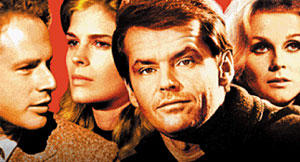Mike Nichols' Couples - Albee and Everything After
 Edward Albee entered my life holding Samuel Beckett's hand. In a school district where censorship and book banning were regularly discussed, that Zoo Story was taught and that Endgame was available in the library remain mysteries to me. By the time I read Who's Afraid of Virginia Woolf, I'd decided that Albee was perhaps the cruelest writer I'd read; his cynicism and lovelessness were passionate, unforgiving, and relentless.
Edward Albee entered my life holding Samuel Beckett's hand. In a school district where censorship and book banning were regularly discussed, that Zoo Story was taught and that Endgame was available in the library remain mysteries to me. By the time I read Who's Afraid of Virginia Woolf, I'd decided that Albee was perhaps the cruelest writer I'd read; his cynicism and lovelessness were passionate, unforgiving, and relentless.His compassion was perverted. It isn't that he doesn't care about his characters; on the contrary, he clearly cares about them considerably, but wishes triumphant, cleansing pain upon them, dousing them with torrential sadism. Mike Nichols' adaptation was so true to the original in that classic cruelty, so palpable is the tension between Taylor and Burton. But for Nichols, that tension and taboo would prove formulaic, a theme he'd return to twice, separated by thirty-three years. In between times, what Nichols seems to have missed is the fundamental shift in public opinion about marriage and adultery.
What makes Carnal Knowledge so edgy and Closer an exercise in banal titillation stems from our expectations about ascribed gender roles and the degree to which those understandings can be subverted. That the women in Carnal Knowledge would be endowed with aggressive sexual appetites, be intelligent and employed and that the men would be chest-thumping, foulmouthed and impotent speaks volumes about Nichols' incisive take on the burgeoning second wave and provincial attitudes toward women. What Nichols fails to realize is that in the interim, behind the outmoded and backward worldview that passes for morality today, America accepts the seamy underworld and appreciates it in a collective sense in much the same way the neighborhood speakeasy was an open secret; there's doubtless a transgressive zealotry afoot in those seemingly chaste households, each harboring incipient cultural terrorists. The Lewinsky scandal demonstrated that public opinion about monogamy and adultery had changed, even if husbands and wives weren't sharing their thoughts on the subject.
But Nichols maintains an Updikean sensibility about urban and urbane sexuality that seems at odds with his intentions. Closer feels so suburban and middle class; there's no pretense of sophistication or detachment. Every character makes immediate connections and longs to possess that person. The very notion of requited love in a film meant to be about calculating casanovas and damsels in distress struck me as quaint. But perhaps for Nichols, it's time to apply nostalgic lacquer to the stripped furniture of his former glory, and remake all the world as Shillington.

0 Comments:
Post a Comment
<< Home